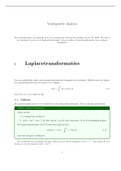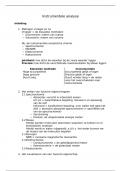Intent: As Ockham’s razor dictates that the burden of proof is on the more complex theory (dualism is
more complex than physicalism), we will explore two dualist arguments against physicalism, and apply
them directly to identity theory. After this, we will consider one issue that is particular to identity theory
(multiple realisability). We will conclude that the dualist arguments are insufficient to reject physicalism.
However, identity theory cannot provide a convincing response to multiple realisability. Upshot, we should
explore alternative physicalist theories (e.g. eliminative materialism).
Against: Chalmers’ philosophical zombies argument – as a philosophical zombie is metaphysically possible,
mental states cannot be reduced to physical states, including brain states (a conscious human being has
the same brain states as a p-zombie, but possess a different mental state, qualia).
For: Chalmers’ begs the question assuming that physicalism is false and mental states are not
analytically identical to brain states (i.e. a p-zombie is only logically possible if we assume mental
states don’t analytically reduce to physical states).
Against: Identity theory doesn’t claim that mental states and brain states are analytically identical.
Therefore, according to identity theory a p-zombie is logically possible.
For: Just because a scenario is logically possible this doesn’t mean it is metaphysically possible (e.g.,
‘water is H30’ is logically possible, but not metaphysically possible). Mental states and brain states
may not share the same analytic identity, but they may share the same metaphysical identity, and
therefore – contra Chalmers – a p-zombie may be logically possible but this doesn’t mean it is
metaphysically impossible.
Intermediate Conclusion: Chalmers’ argument is insufficient to reject the identity claim that mental
states are metaphysically identical to brain states.
Against: Jackson’s Knowledge/Mary argument – Mary knew all about what brain states are realised when
people look at colour. When she saw colour for the first time she learnt a new, non-physical, phenomenal
fact about what it is like to experience colour. The mental cannot be entirely captured by brain states.
For: Mary didn’t increase her propositional knowledge [about a phenomenal fact], but ability
knowledge; how to imagine and identify red.
Against: We can conceive of someone who has both abilities, but only knows what it is like to
experience colour at the point at which they experience it, either in the imagination or reality.
For: Mary didn’t increase her propositional knowledge [about a phenomenal fact], but
acquaintance knowledge; first-hand, direct experience of the brain state realised by experiencing
colour. She already knew about the relevant brain state, now she simply has knowledge of it.
Against: Acquaintance knowledge is a means by which we can increase our propositional
knowledge. True, Mary increased her acquaintance knowledge, but at the same time she gained
propositional about what it is like to experience colour (a phenomenal fact). A fact she would
recognise she didn’t know before experiencing colour.
For: Mary increased her propositional knowledge, but only of an old physical fact. For example, if
someone knew that ‘ice is water’, and then after being taught that water is H20, knew that ‘ice is











